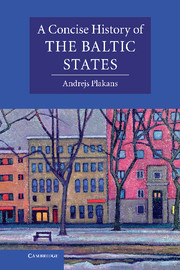Book contents
- Frontmatter
- Contents
- List of plates
- List of maps
- Preface
- 1 The peoples of the eastern Baltic littoral
- 2 The new order, 1200–1500
- 3 The new order reconfigured, 1500–1710
- 4 Installing hegemony: the littoral and tsarist Russia, 1710–1800
- 5 Reforming and controlling the Baltic littoral, 1800–1855
- 6 Five decades of transformations, 1855–1905
- 7 Statehood in troubled times, 1905–1940
- 8 The return of empires, 1940–1991
- 9 Reentering Europe, 1991–
- Suggested readings
- Index
- CAMBRIDGE CONCISE HISTORIES
6 - Five decades of transformations, 1855–1905
Published online by Cambridge University Press: 05 June 2014
- Frontmatter
- Contents
- List of plates
- List of maps
- Preface
- 1 The peoples of the eastern Baltic littoral
- 2 The new order, 1200–1500
- 3 The new order reconfigured, 1500–1710
- 4 Installing hegemony: the littoral and tsarist Russia, 1710–1800
- 5 Reforming and controlling the Baltic littoral, 1800–1855
- 6 Five decades of transformations, 1855–1905
- 7 Statehood in troubled times, 1905–1940
- 8 The return of empires, 1940–1991
- 9 Reentering Europe, 1991–
- Suggested readings
- Index
- CAMBRIDGE CONCISE HISTORIES
Summary
The 1850s contained two internal events of great significance for the Russian Empire: the arrival on the imperial throne of Alexander II, another “reforming” tsar, in 1855; and the lack of accomplishment in the Crimean War (1853–1856). The latter set off in imperial circles discussion about fundamental reforms to bring Russia to the level of what was perceived to be the advanced western European countries. In the Baltic littoral, these developments coincided with certain local dissatisfactions: the emancipation of serfs in Estland, Livland, and Kurland and the introduction of labor rents had not produced endless agricultural progress. The rural populations continued to be restive, liberalism of different kinds seemed to taking firmer root even in the minds of some members of the Ritterschaften and certainly among the Gelehrten; and the urban patriciates were becoming more resentful over their inability to seize growing economic opportunities in trade and commerce. In the administratively fragmented Lithuanian lands, the harsh russification measures of Nicholas I had not succeeded in eroding memories of statehood and of the failures of the 1830–1831 uprising. Other events, originating outside the empire, also found resonance in the western borderlands: the 1848 revolutions in central Europe, though viewed as unsuccessful, nonetheless toppled the “Metternich system” of intellectual control and left a generation of central European nationalists with a deep craving for another “springtime of peoples.”
- Type
- Chapter
- Information
- A Concise History of the Baltic States , pp. 215 - 265Publisher: Cambridge University PressPrint publication year: 2011



